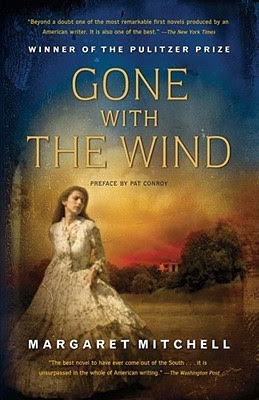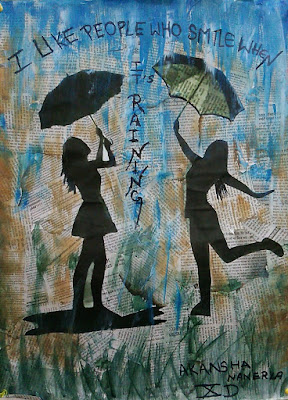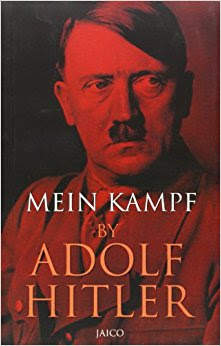Riddhi Singhania, Class X D
An imaginary interview with Adolf Hitler, author of ‘Mein Kampf’
I (Riddhi) : It is nice to meet you, ‘The Hitler’, the Nazi leader, the ex-dictator of Germany, and to interview you. I recently read volume ‘I’ of your autobiography ‘Mein Kampf’, and I cannot wait to ask you some questions to quench my curiosity.
A.H. (Adolf Hitler) : I will answer all the questions with the honesty of a Nazi.
I : My first question to you is a cliche, yet, very important – what made you write this book?
A.H. : The Nazi point of view is a bit deep to understand, but is significant for the development of Germany. The time I spent in prison could not be spent futilely for there were great many steps we had to take for Germany. I wanted the people to understand the Nazi view and our struggles, and hence I wrote this book.
I : The name of your book is ‘Mein Kampf’- My Struggle. This term ‘struggle’ is used in a positive or a negative sense – had you desired an easier life?
A.H. : I think fate was kind to me to let me experience poverty and struggle. My father too had risen from sufferings and was a self-made man. My struggles let me feel the actual sufferings, humanity and what was actually needed by Germany for its development.
I : True. In the book, you have openly and wholeheartedly criticised democracy. But taking the example of my country India, where democracy has been a great success, what are your opinions on this?
A.H. : I love freedom. And contrary to your statement, I feel that democrcy is the best form of government. Since my childhood, I always had been attracted to the British Parliament. However, the Germans were being misrepresented in the Austrian Parliament, and that compelled me to open up my views on the same. Later, it was necessary for Germany to have a faithful dictator who could sweep all the ‘others’ out and develop the nation for its ‘own’ people.
I : What do you think was the greatest struggle of your life?
A.H. : Ah, it was the years I spent in Vienna after my parents’ death. Amidst suffering and misery, I had to work as a daily labourer. Then I also worked as a meagre painter. I often got into fights upon my political opinions. The only pastime was books, newspapers and the rare opera shows.
I : If your political views had started shaping so early, why didn’t you enter politics immediately, instead of joining the regiment?
A.H. : A nice question. I believe one should not enter politics till his thirtieth year, until when he has matured his outlook and positions on political matters. And as I was ready to even die for the Reich, my youth encouraged me to join the Bavarian Regiment.
I : You believe that only the superior must live and so you carried out massacres in Germany. I have read ‘The Diary of A Young Girl’ by Anne Frank, a Jewish girl, on how she and her family had struggled during the holocaust. Do you think your step was right?
A.H. : Yes, of course. In my great sufferings I have carefully examined the society and history. We, the Aryans are the purest of the races, and the Jews, the usurers. We could not compromise our resources for the inferior race, and the holocaust was thus, inevitable.
I : With the Second World War, we’ve certainly seen the dangers that underlie such a viewpoint, but of course, you’ve not been around to learn the same. Let’s move on to something different. You’ve mentioned in the book that you wanted to become a painter. Was it a mere childish dream or a serious thought?
A.H. : Ah, yes. Despite my father’s persuasion that I become a civil servant, I wanted to pursue painting. However, after my parents’ death I realised I could become a successful architect. I started saving money for it by working as a labourer. Amidst the political instability at that time, my mind diverted, and I joined the regiment, and then, finally, politics.
I : With these ambitions, how did you perform in school?
A,H. : As I had decided to become a painter, I dedicated myself only to the related or my favourite subjects and left the others. Thus, my report cards were filled with extremes. It was ‘laudable’ and ‘excellent’ in Geography and History and ‘adequate’ or even ‘inadequate’ in others.
I : You say that you like History. Isn’t it all about learning dates and events? How did you like the subject?
A.H. : No – History is not about learning dates and events, but about understanding the causes that lead to an event. I must mention my History professor Dr. Leopold Potsch, who made us all fall in love with the subject by bringing the events to life in the classroom.
I : What quality do you think makes one a great leader?
A.H. : Definitely the skill of oration, and I was good at it. Good speaking skills are more influential than writing. When I attended my first meeting of German Workers’ Party, I got a chance to speak. Only because of my oration, I was made a member. And, it were those encouraging speeches given in various party meets, that increased the attendance from just seven to seventeen, thirty-four and even over four hundred!
I : Thank you Adolf for answering all my questions with such candour and sharing your opinions with us. But for your blinding arrogance, the world would have had a wonderful leader in you!

 Ans. Well the entire point was to show how Scarlett didn’t let go of life and hope like the other ladies even when her life took turns like no others. How her ambition was to make her life beautiful again which took strong will and guts but sometimes how being overambitious can make one too brash and ruthless and just crush you one day.
Ans. Well the entire point was to show how Scarlett didn’t let go of life and hope like the other ladies even when her life took turns like no others. How her ambition was to make her life beautiful again which took strong will and guts but sometimes how being overambitious can make one too brash and ruthless and just crush you one day.









